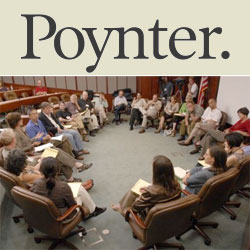QOTD: Who keeps you straight?
 As our news director Martha Foley puts it:
As our news director Martha Foley puts it:
“The Poynter Institute is the high church of journalism ethics.”
When Poynter published an article on the recent This American Life retraction of Mike Daisey’s story about Chinese workers in Apple factories, we all read it with interest. We’ve been blogging about the issue, most recently in All In. You can read the full article from Poynter on their website.
Here’s the list of questions Poynter would like Ira Glass and the TAL team to answer:
- What specifically is the fact-checking process at “This American Life”? Does this apply to all stories? If not, which ones?
- As this show was being produced, did the staff have an opportunity to raise concerns about the reliability of Daisey’s account? Would their input have mattered?
- Besides the decision to go forward without hearing from the translator, has the staff found other specific failings in its editorial process?
- Who specifically decided that this story was fit to air?
- In light of the translator’s account, has the staff considered why they discounted the opinions of their sources who doubted Daisey’s contention that Foxconn employs underage workers?
- Did the staff consider whether there was another way to air this story without relying solely on Daisey’s account?
- Will the show change its vetting procedures as a result of this incident?
- Will staff be hesitant to bring performers and others into journalistic stories in the future? Will they handle those situations differently?
- Are listeners to understand that all of the stories on “This American Life” should be viewed as literal truth-telling, up to the standards of journalism?
This rigor is what makes Poynter, well, Poynter–the go-to place when questions about best practices in journalism and media come up in our shop. If you’d like to know more about Poynter, go here.
Today’s Question of the Day is:
In your work, what or who is the recognized standard bearer for ethics and best practices?
Tags: Ira Glass, journalism ethics, Poynter, This American Life








Me. To thine own self be true.
When I was still teaching, mostly the students. When I failed to get work back reasonably soon, or had what they considered unfair assignments or test questions, they would let me know. Some always complained, but when the hard workers did, they were probably right. When I was presenting something and their eyes glazed over, I could tell I needed to do something different.
the Golden Rule…
and a still, small voice.